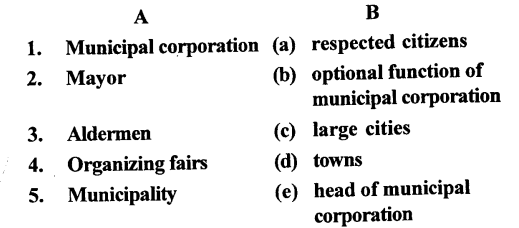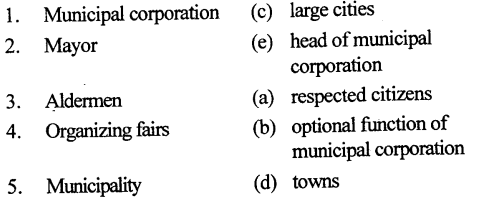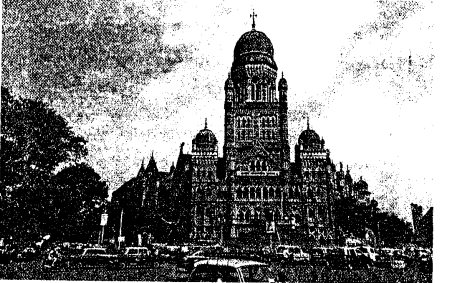The Trail History and Civics for Class 6 ICSE Solutions – Urban Local Self-Government
ICSE SolutionsSelina ICSE SolutionsML Aggarwal Solutions
The Trail History and Civics for Class 6 ICSE Answers
Trail HistoryCivicsHistory & Civics Geography Biology Chemistry Physics Maths
Keywords
- Metropolitan: is related with a big and important city of a country.
- Municipal corporation: is the local self-governing body in a large city.
- Aldermen:They are members of the municipal corporations and municipalities who are elected from among the popular and respected citizens of that city.
- Sanitation: It means keeping an area clean and free from germs and dirt.
- Crematoria: They are those area where dead bodies are burnt.
- Property Tax: It is the tax on houses and land. Entertainment Tax:- It is the tax on entertainment activities such as Cinema halls, circuses, etc.
- Education tax: It is collected for educational activities.
- Toll taxes: They are collected for the use of roads and bridges.
EXERCISES
A. Fill in blanks:
- The local self-governing bodies which look after the needs of big cities is Municipal corporation.
- A mayor holds office for a term varying between 1 year and 5 years.
- The state government supervises the working of municipal corporations.
- Some seats in the municipal corporation are reserved for Scheduled Castes and Scheduled Tribes.
- The municipal corporation establishes and maintain public parks and education centres.
B. Match the following:

Answer:

C. Choose the correct answer:
1. Big cities like Delhi and Mumbai have town area committees/municipalities/municipal corporations.
Ans. Big cities like Delhi and Mumbai have municipal corporations.
2. The mayor/municipal commissioner/alderman presides over the meetings of the municipal corporation.
Ans. The mayor presides over the meetings of the municipal , corporation.
3. The chief executive officer of a municipal corporation is known as the mayor/municipal commissioner/sarpanch.
Ans. The chief executive officer of a municipal corporation is known as the municipal commissioner.
4. The total number of members of a municipal corporation of a city depends on the population of the city/state/ country.
Ans. The total number of members of a municipal corporation of a city depends on the population of the city.
5. A municipal corporation is elected for a period of 2/10/ 5 years.
Ans: A municipal corporation is elected for a period of 5 years.
E. State whether the following are true or false.
- Port trust is an urban local self-governing body.
True. - The members of the municipal corporation are directly elected by the adult citizens of the city.
True. - Some seats are reserved for women in municipal corporations.
True. - The municipal corporation is not responsible for the supply of safe drinking water.
False.
Correct: The municipal corporation is responsible for the supply of safe drinking water. - The municipality is the local self-governing body for smaller cities and towns.
True.
F. Answer the following questions in one or two words/ sentences:
Question 1.
Name the local self-governing bodies that look after the urban areas.
Answer:
The local self-governing bodies which look after the urban area are as follows:
- Municipal Corporations
- Municipalities
- Town area committees
- Cantonment boards
- Improvement trusts
- Port trusts
Question 2.
Who is mayor?
Answer:
Mayor is the head of the municipal corporation.
Question 3.
What is the functions of the mayor?
Answer:
He presides over the meeting and looks after the work of the corporation with the help of the executives officers like Municipal commissioner, chief medical officer etc.
Question 4.
Who are aldermen?
Answer:
They are members of the municipal corporation and municipalities who are elected from among the popular and respected citizens of that city. They are generally experienced.
Question 5.
What are municipalities?
Answer:
Smaller cities and towns with population ranging between 20,000-5,00,000 have municipalities as the local self-governing body.
F. Answer the following questions briefly:
Question 1.
How is a municipal corporation composed? Who are its members?
Answer:
A municipal corporation is composed in following manner.
- The Mayor is the head of the municipal corporation. The mayor and deputy mayor are elected by the members of the municipal corporation from among themselves.
- The corporation sets up a number of committee to look after the day to day work.
- There is a chief executive officer or municipal commissioner, who is appointed by the state government.
- There are also number of members called aldermen. They are elected from among the popular and respected citizens of that city.
- MPs and MLA also form part of the corporation.
- Some seats are reserved for the scheduled caste, scheduled Tribes and women.
A municipal corporation is elected for a period of 5 years.
Question 2.
Mention five functions of the municipal corporation related to public health and sanitation.
Answer:
The main five functions performed by municipal corporation are following.
- Caring for health of citizens, provide treatment facilities, opening hospital, appointment of doctors etc.
- Repair and construction of roads, street, providing electric facilities etc.
- Provision for education by opening and looking after primary school.
- To save people from disaster of fire and fire brigades are maintained.
- Organizing cultural events like sports, exhibitions, fairs etc.
Question 3.
The municipal corporation is responsible for the maintenance of public works and services in the city. Give any five examples to explain this.
Answer:
The municipal corporation is responsible for these public works and services:
- Construction and maintenance of roads, bridges, public buildings, markets, crematoria and graveyards.
- Construction and maintenance of water supply system.
- Arrangements for street lighting.
- Maintenance of fire brigade.
- Demolition of dangerous or illegal buildings.
- Maintaining records of births and deaths.
Question 4.
List the optional functions of the municipal corporation.
Answer:
Optional functions of the municipal corporation are following:
- Establishment and maintenance of public parks, gardens, zoos, theaters, picnic resorts, libraries, museums.
- Construction and maintenance of old-age homes, orphanages, night shelters, rest houses.
- Supply of cooking gas and milk.
- Organizing cultural events like sports, exhibitions, fairs, etc.
- Maintenance of a cheap public transport system.
G Picture study:
This-is the picture of Mumbai Municipal Corporation headquarters. With reference to the picture of the municipal corporation, answer the following questions:

1. Who is the head of the municipal corporation? Hon is he or she elected?
Ans. The Mayor is the head of the municipal corporation. He/she is elected by members of the municipal corporation from among themselves.
2. For which categories of community’ are seats of the corporation reserved?
Ans. Seats are reserved for following categories.
- Scheduled castes
- Scheduled Tribes
- A few seats are reserved for women.
OTHER IMPORTANT QUESTIONS
Question 1.
In what ways is a Municipality different from a Municipal Corporation ?
Answer:
The difference between a municipal Corporation and Municipality are as follows:
- Municipal corporation are made in big cities where population is 10 lakh or more whereas Municipal committees are made in the cities where population is less than 10 Lakh.
- Municipalities are under the control of district authorities whereas corporation are under the direct control of government corporations have functions more than Municipalities to do. So they have more facilities than the municipalities have.
Question 2.
Distinguish between:
Answer:
- Councillor and An Alderman— A Councillor is elected by all members of a town whereas an alderman is elected by councillors.
- The Mayor and the Deputy Mayor— The Mayor is elected by all members of a corporation and so is the Deputy Mayor. In the absence of the Mayor, his all duties are performed by Deputy Mayor.
Question 3.
What are some of the sources of income of municipalities and municipal corporations?
Answer:
The sources of income of municipalities and municipal corporation are taxes on property, houses, shops, stands, vehicles, charge of water and electricity, education. Tax is collected for educational activities, Toll tax and the municipality’ also gets grants from the state government.